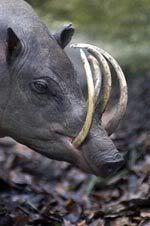 |
| Image from Oregon Zoo |
This is the Babirusa (Babyrousa sp.), a pig from Indonesia, whose name translates into “pig-deer.” Apparently, the… impressive dentition of the males look like antlers to some natives, but I don’t see it. While the picture may look like the top tusks grow through the snout, don’t let that fool you. They actually grow straight through the snout. While the males do fight fiercely for the females, the top tusks seem to serve only as ornamentation. While the natives claim that males can hang these tusks on branches to support their heads, other sources dispute this1.
Despite the formidable canines, these swine are herbivorous, even more so than many other Suidae. Since the tusks prevent searching for food by rooting, they rely on fruits, leaves, nuts, and the occasional insect larva. With this plant-heavy diet, they have developed a complex stomach, to the point that some people argued whether they were ruminants, and thus Kosher, or not2.
Unlike most other pigs, the Babirusa only give birth to about three babies a year, and are slow to reach sexual maturity. Add this to the facts that a) habitat loss, as forests are being cleared, and b) they’re a pig, and thus tasty, and you have the recipe for an animal listed as Vulnerable by the IUCN.
Conservation efforts are picking up, though. They’ve recently protected a large area of forest that the Babirusas inhabit, as well as increasing penalties for selling their meat. I even found an economic journal that states that, by their measurements, the penalties are enough to decrease poaching of these animals. Alas, captive breeding efforts aren’t going as well, as many of the Babirusas in American zoos are related, leading to definite genetic problems.
1I’m always cautious refuting native claims. They’ve lived with the animals for generations, so they’ve probably seen some strange things that the visiting scientists only dream of.
2To anyone reading my blog who keeps Kosher: They’ve decided that the Babirusa is treyf, so if you felt like traveling to Indonesia to eat an internationally protected pig, sorry.

No comments:
Post a Comment